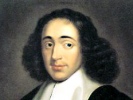
Sacred Texts Philosophy Spinoza Index Previous Next
Buy this Book at Amazon.com


Correspondence, by Benedict de Spinoza, [1883], at sacred-texts.com
[Spinoza gives the required explanation. Mentions the treatise of Huet, &c.]
Distinguished Sir,—With regard to your question as to whether the variety of the universe can be deduced à priori from the conception of extension only, I believe I have shown clearly enough already that it cannot; and that, therefore, matter has been ill-defined by Descartes as extension; it must necessarily be explained through an attribute, which expresses eternal and infinite essence. But perhaps, some day, if my life be prolonged, I may discuss the subject with you more clearly. For hitherto I have not been able to put any of these matters into due order.
As to what you add; namely, that from the definition
of a given thing considered in itself we can only deduce a single property, this is, perhaps, true in the case of very simple things (among which I count figures), but not in realities. For, from the fact alone, that I define God as a Being to whose essence belongs existence, I infer several of His properties; namely, that He necessarily exists, that He is One, unchangeable, infinite, &c. I could adduce several other examples, which, for the present, I pass over.
In conclusion, I ask you to inquire, whether Huet's treatise (against the "Tractatus Theologico-Politicus") about which I wrote to you before, has yet been published, and whether you could send me a copy. Also, whether you yet know, what are the new discoveries about refraction. And so farewell, dear Sir, and continue to regard yours, &c.
The Hague, 15 July, 1676.
409:1 Tschirnhausen.